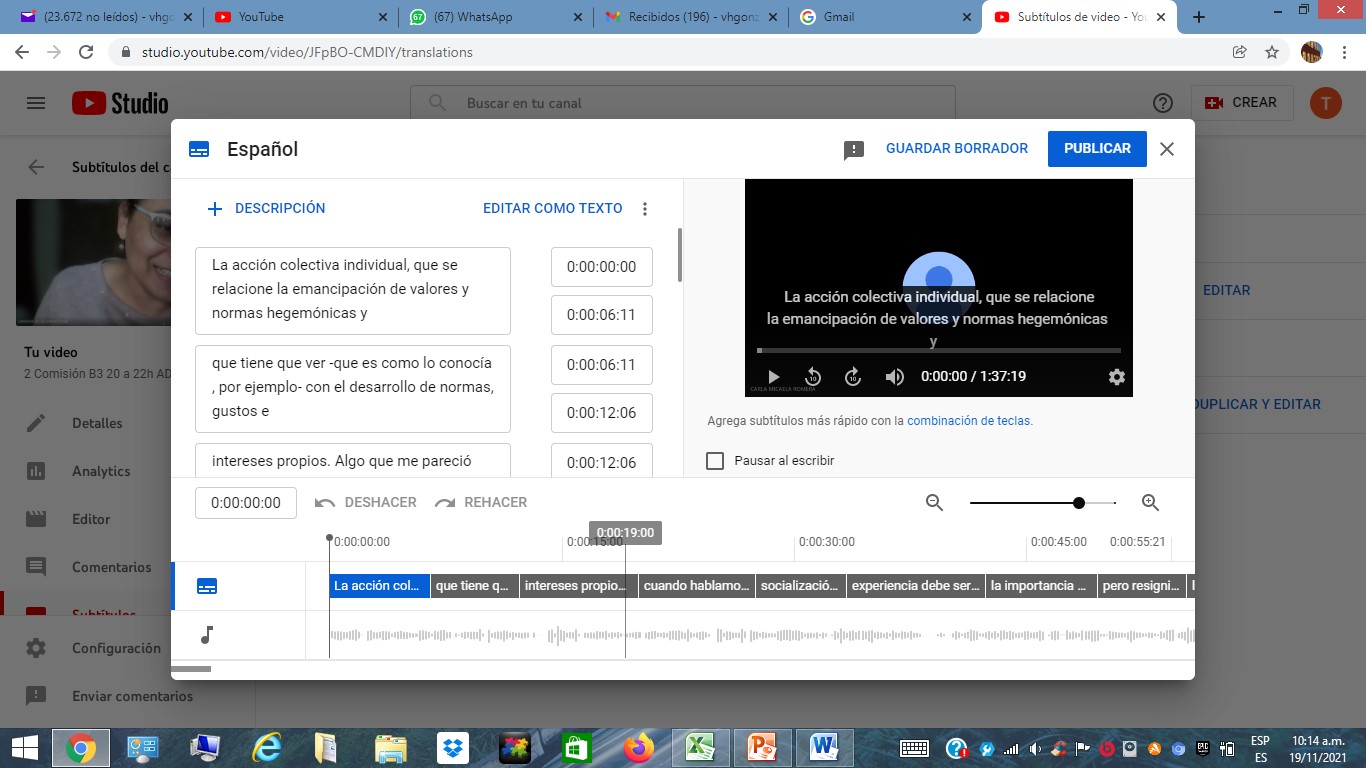Introduction
The Argentine Association of Parliamentary Stenographers (AATP) has agreed on a collaboration with Argentina’s oldest university, The National University of Cordoba, to provide subtitling and edited transcripts to students with disabilities. The agreement aims to make sure that education standards for students with disabilities are not made worse by the movement towards more online learning since the beginning of the Covid pandemic.
In this article, I describe the objectives and the work process of this service where volunteer stenographers aim to make university studies accessible for everyone.
Background and objectives.
The National University of Córdoba (UNC) is a public university in Argentina based in the city of Córdoba. Founded in 1613, it is the oldest university in the country and one of the first established in America. In addition, it is considered to be one of the most prestigious places of study, and it has significant international recognition.
The global pandemic forced educational systems to move to the virtual technologies. With online courses, they have tried to sustain and guarantee the educational processes and the academic trajectories of the students, which has been one of the greatest challenges for them. Since March 2020, the National University of Córdoba has implemented a change in pedagogical practices which has affected almost 10,000 teachers and about 140,000 active students. The pandemic has accelerated the process of digital transformation and, both from the point of view of management and education, as a public university, clearly the challenge has been to face this process in an inclusive way, without leaving any student out of the system. Technology should be a tool for inclusion and not for exclusion.
Following this principle, AATP, with the help of the Secretary for Student Affairs of the UNC, made an effort to learn about the student population with disabilities and the challenges that virtual studies present to their education. The possibilities of the deaf, hard of hearing, blind and other students with disabilities to fully access information were limited or conditioned. This became even more acute during the pandemic, forcing educators to turn towards virtual solutions.
For this reason, AATP and UNC created a project whose objective is to overcome the barriers that may arise in communication between the student population and the university. The association provides advice and guidance, and the university carries out the necessary actions in order to reduce the inequity, and to help the students with disabilities to gain the access that is needed to study in virtual settings and fully participate in the academic culture of the university.
Work Process
The work plan of the project has several phases. In the first stage, volunteer stenographers will provide students with a delayed subtitling of video lectures of the different subjects. This gives them not only quality subtitles of the lectures but also, as a by-product, a transcription of them to help the students in their studies.
From the AATP, it was quite a research task to analyse what was the best way to carry out the subtitling work. The association compared the productivity between manual subtitling and automatically generated subtitling by artificial intelligence.
Automatically edited subtitling is incomparably fast, but it needs editing to work. However, the time taken to edit the automatic subtitling was still considerably faster than working with manual subtitling: for five minutes of video, manual subtitling takes 40 minutes on average. In contrast, automatic subtitling takes 20 minutes, even with the necessary editing. This means that it takes half the execution time compared with manual labour.
Therefore, for productivity, the best solution was to choose working with the automatic subtitling that was provided by a video platform and doing the necessary editing work. To do this, we took advantage of the benefits of the virtual realm. We were able to put together a group of volunteer stenographers and subtitlers from all over the country to work remotely as an interdisciplinary team. At present we are a team of 11 volunteers. The work is organised with the same format as is used in our parliaments.
For example, the practice video with a duration of 1 hour 37 minutes was divided among the 11 volunteers in units of 8 minutes 51 seconds to edit the automatic subtitles as follows:
| STENOGRAPHER | TURN | FROM | UNTIL |
| DEBORA | 1 | 0:00:00 | 0:08:51 |
| YOLY | 2 | 0:08:51 | 0:17:42 |
| ANDREA | 3 | 0:17:42 | 0:26:32 |
| GRACIELA | 4 | 0:26:32 | 0:35:23 |
| NOEMI | 5 | 0:35:23 | 0:44:14 |
| VICTOR | 6 | 0:44:14 | 0:53:05 |
| YANINA | 7 | 0:53:05 | 1:01:56 |
| LAURA | 8 | 1:01:56 | 1:10:47 |
| CRISTIAN | 9 | 1:10:47 | 1:19:37 |
| ALFREDO | 10 | 1:19:37 | 1:28:28 |
| FERNANDO | 11 | 1:28:28 | 1:37:19 |
The work begins when the university sends the volunteers the audiovisual material that the student needs subtitles for. The video is uploaded to a video platform, where the automatic subtitling is generated. The duration of the video is observed, and the editing labour is divided among the team of volunteers. Each one edits their part. After editing, a volunteer reviewer reviews the entire work. Also, the reviewer makes sure that the subtitles are downloaded correctly and that there is the corresponding transcript of the lecture. Both the subtitles and the transcript are then sent to the university for the students.

In March 2022, we have started executing the project. Weekly we receive requests for editing, subtitling and transcription for students with hearing disabilities from different academic units of the university. We currently have a new challenge: part of the team also does audio description for blind students and this has had a good reception from users.
Perspectives and conclusions
With great pride, on December 3, 2021, the International Day of Persons with Disabilities, we witnessed the chancellor of the National University of Córdoba, Rector Dr. Hugo Juri, sign the agreement of collaboration with the AATP. For this initiative we have a minimal budget, and the support of the volunteering stenographer colleagues who joined the editorial team has been vital. Our aim now is to gather more colleagues and friends to help us make university studies accessible to all students.
Víctor González is an independent accountant and also works as a stenographer in the Córdoba Parliament. He is currently the president of the Argentine Association of Parliamentary Stenographers.





[…] Victor González:Stenographers in Support of Students with Disabilities […]